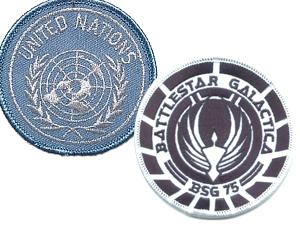Sci-fi at the UN
Someone at the United Nations must be a pretty big fan of the show "Battlestar Galactica." The world body hosted a panel discussion at its New York headquarters, and it invited “Battlestar Galactica”’s creators and a couple of the stars to take part. And UN meets Sci Fi why? Well, to find out, I scoured the newsroom today for a fan of “BSG” as aficionados call it. Luckily, I found our own Clark Boyd. One aficionado, Clark, to many in the audience presumably, how come you like the series so much?
Clark Boyd: Well Lisa, what I really like about the series is that it’s science fiction, and I do enjoy a good science fiction tale. But what they’ve done with "Battlestar Galactica," at least this iteration of it because, you know, this isn’t the "Battlestar Galactica" from the late 1970’s, this series is what they call a "re-imagined" series.
Mullins: No Lorne Green in this one?
Boyd: No Lauren Green in this one. And the reason that I love it so much is that it really grounded the plots in real life, in things that are going on around us every day in the world.
Mullins: Like what?
Boyd: Well, for example, terrorism, torture, refugee rights and things like that. So it has the feel of being in the future and very far away but also very, very close to home.
Mullins: All right. So I assume that the other part, the dealing with modern day issues part, is a reason that the United Nations would take an interest, but specifically why would it talk to the writers and the stars?
Boyd: Well, to get a better answer on that, to get a better answer on that, to get a better handle on that, I thought I would go out and find another fan so that you just don’t have to take my word for it. And it didn’t take long, of course. And I got in touch with John Walsh, who is a computer systems administrator at Northwestern University in Evanston, Illinois. And actually, I got him on the phone this morning and I think he put it best. Let’s hear what he has to say about why Battlestar Galactica is so relevant.
John Walsh: You’ve got civilians getting killed, you’ve got terrorism, you’ve got religious views. It’s really keeping grasp with world events.
Boyd: And so what John and I wanted to do was come up with a scene that we could present to you that kind of encapsulates these deep issues that are explored on the program. And the one that we came up with happens – you have to understand that there are only 40,000 survivors after a nuclear holocaust on these far away planets, and they’re kind of flying through space, some in military ships and some in civilian ships. And so you have a lot of issues that deal with refugees, and you have that classic tension between the military’s needs to keep people safe and civilian needs to stay alive – food, water, things like that. And in this scene, military officers board a civilian ship and they try to requisition by force personnel and fear.
Mullins: So that scene there, in kind of a wider reference to as you say, Clark, the refugee issue, but I have one other question about this. Is this part of a larger United Nations effort, talking to the stars and the writers of Battlestar Galactica tonight, is that part of a bigger effort to tap into pop culture? And if so, how come?
Boyd: It is actually part of a larger effort. They were written into a Spiderman comic storyline last year by Marvel Comics. They’ve recently been seen on television programs such as "Law & Order: Special Victims Unit." I think it is part of a larger push of what they’re calling community outreach to let people know that the United Nations is relevant, that they’re doing relevant work, and I actually think that the Battlestar Galactica panel is a great tie-in to what they do.
PRI’s "The World" is a one-hour, weekday radio news magazine offering a mix of news, features, interviews, and music from around the globe. "The World" is a co-production of the BBC World Service, PRI and WGBH Boston.
